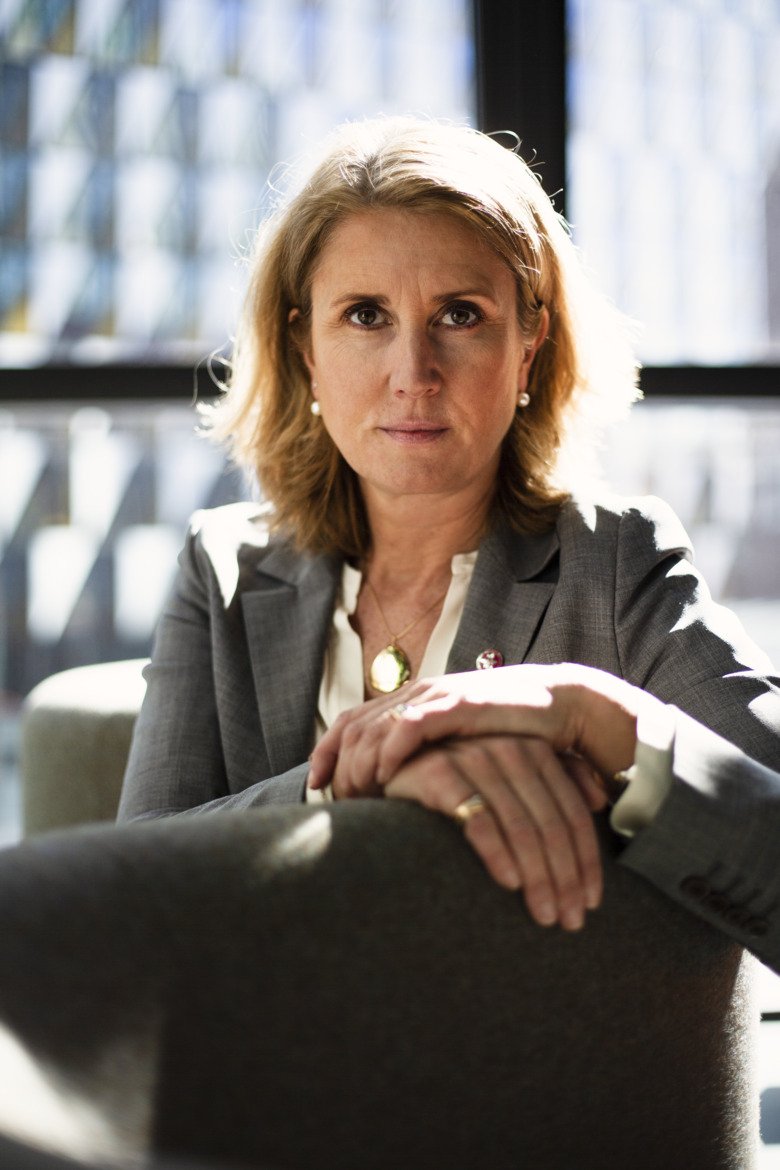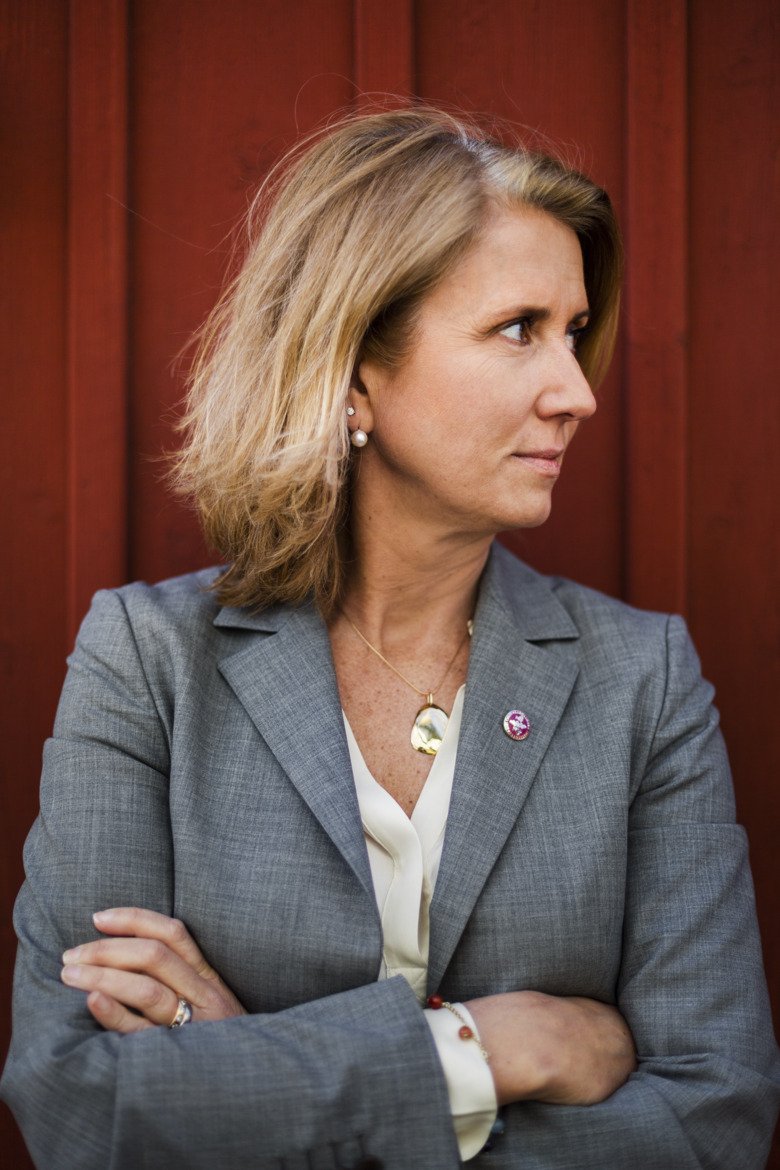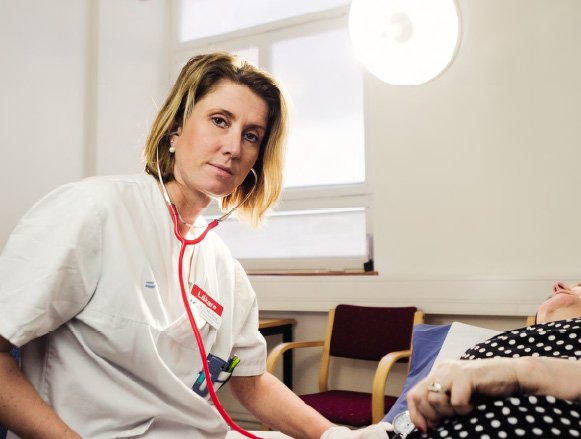She counts every step to cure colorectal cancer
“As long as we are making progress, no matter how little, it gives me the strength to keep on working.” Surgeon and professor Anna Martling does not rest on her laurels: Now she is testing whether regular aspirin might be the next step to improve the prognosis in colorectal cancer.

Text: Cecilia Odlind, first published in Swedish in Medicinsk Vetenskap, No 2/2020.
Around 16,000 people develop colorectal cancer annually in Sweden and the disease grows every year.
“We do not know why. One reason might be that we are becoming older and older, which increases the risk of developing cancer. It might also have something to do with our lifestyle, that we do not move around enough and eat certain foods that increase the risk, such as red meat,” says Anna Martling.
The disease mainly affects people in their 70s, but there has also been an increase in recent years among people under the age of 50.
“This is a new and concerning phenomenon that we have seen in our research. We need to investigate the causes more thoroughly,” she says.
Improving the prognosis and quality of life for patients with colorectal cancer is Anna Martling’s goal both as a doctor and a researcher.
“We develop new treatments and test them. By conducting well-designed studies and being persistent, we are always taking small steps in the right direction. In the long term, this means major improvements for patients,” she says.
Anna Martling began her research 25 years ago. Back then, her focus was on preventing local relapses of cancer in the bowel. At that time, the bowel cancer came back in 30 per cent of patients.
“The relapse risk is now around five per cent, so we have become a lot better at treating local tumours. However, colorectal cancer remains one of the deadliest forms of cancer, with the dispersed, metastatic form being the most dangerous. This is why a great deal of the research is now dedicated to preventing the tumours from spreading,” says Anna Martling.
Historically, surgery has been the only curative treatment against this form of cancer. Today, it is possible that the patient might not even need surgery, in some cases radiation and chemotherapy might be enough, something that Anna Martling is researching in an ongoing study.
Over the last 25 years, the treatment has also moved towards becoming tailored to the individual patient.
“Thanks to the new precision medicine, which includes measuring the presence of certain genes, RNA, or proteins, it is now possible to customise the treatment. Precision medicine is still in its infancy with regard to colorectal cancer, but it will be able to influence which treatment is given to individual patients in the future. This may include, for example, choice of surgical strategy, radiotherapy and whether to use drugs or not,” she says.
The outcome is also influenced by the order in which treatments are used, such as surgery in relation to radiotherapy.

“This could be important, especially when it comes to reducing the risk of complications and side effects. The fact that we often remove a large part of the intestine can cause permanent problems, which has a major impact on the quality of life. The goal is to provide treatments that are as gentle as possible but that still has the greatest possible effect. Precision medicine will help us choose the treatment for each individual case,” says Anna Martling.
Nowadays, researchers are also looking more closely at genetic changes related to different forms of cancer. As an example, it was discovered that there are genetic similarities, which means that you can use treatments that work for one form of cancer and apply them to another.
“For example, immunotherapy got its breakthrough as a treatment for the form of skin cancer called malignant melanoma and has since then been used to treat many other forms of cancer, such as lung cancer and kidney cancer,” Anna Martling says.
Screening saves lives
Since 2008, every person between 60 and 69 in Region Stockholm are screened for colorectal cancer by looking for blood in stool samples. If blood is discovered, you then proceed to an endoscopic examination where the bowel is examined with a camera to look for an explanation for the bleeding, for example polyps or tumours. It was recently recommended that screenings be introduced on a national level, but the final decision is made by each individual region.
“Screening for colorectal cancer is very resource consuming. But several major studies have shown that it leads to reduced mortality for colorectal cancer of around 20-25 per cent. This is why it is almost a little strange that we have waited this long to introduce it on a national level,” says Anna Martling.
Due to the corona pandemic, the screenings in Region Stockholm and other regions are put on hold. How will this impact care and research in the future?
“It will most likely mean that we will have an accumulation of new cancer cases once everything returns to normal. We also see a drastic research reduction in all fields that are not COVID-19. It is currently difficult to predict the consequences,” she says.
One current study that Anna Martling is “truly excited” about is the one on the possible preventative effect of acetylsalicylic acid, a commonly used analgesic and antipyretic substance included in the drug aspirin. Earlier studies have shown that people who regularly take acetylsalicylic acid have a reduced risk of getting the pre-stages of cancer (polyps) in their intestine, as well as a reduced risk of developing bowel cancer.
We are currently studying whether it can also reduce the risk of remote spreading in people with colorectal cancer who have a specific mutation in the tumour cells, she says.
The study will include 600 patients, who will all receive treatment with the drugs included in the study for three years. The first results are expected in 2023.
“If it turns out that acetylsalicylic acid has the effect that we hope it does, then we have a very cheap, well-proven drug which might save 300-400 lives every year in Sweden. This would be a major step forward for the treatment of this patient group,” she says.
New healthcare landscape
As the knowledge generated by research continues to grow, doctors are able to do more for their patients, but it also places higher demands on the healthcare system.
“A lot of additional research and investments, for example in precision medicine, is required in order for us to properly individualise treatment. And researchers in everything from basic research and epidemiology to clinical researchers active within healthcare will need to work together,” says Anna Martling.
However, one challenge for both research and teaching is the new healthcare landscape where a large part of specialist care has been moved away from emergency hospitals to patient choices in outpatient care.
“It is practically difficult to implement research, such as including patients and taking samples, when the patients are receiving care from so many different providers. This is without a doubt the most difficult challenge to conducting good and efficient research in my field, and the same goes for many other fields right now,” Anna Martling says.
Do you ever get tired of this great challenge?
“Not tired, but sometimes I get frustrated. And frustration can be a good motivator. We simply have to solve this and it has to happen through a cooperation between clients, healthcare providers and researchers. Research must be a natural and integral part of caring for the patient. That is why space and resources must be created, regardless of the level of care and mode of operation. It might be a somewhat worn out expression, but it is still true that today’s research is tomorrow’s healthcare,” she says.
No, tiredness is hardly Anna Martling’s defining trait. She also believes that you need not view setbacks as something negative.
“They can provide us with lessons that make us better. If research was only about success, it would not be research,” she says.
Name: Anna Martling
Title: Professor of Surgery at the Department for Molecular Medicine and Surgery, Karolinska Institutet as well as chief physician and colorectal surgeon within Tema Cancer, Karolinska University Hospital. Dean of KI Nord.
Age: 51.
Family: Husband, two adult sons, three bonus sons. I also have a large family in the form of my siblings and their families who give me a great deal of security and belonging.
How I relax: I like crime journalism and stories about crime.
Inspired by: My large family and the many competent colleagues I have met over the years.
Most unexpected research finding: I think that is always in the future, and it is motivating!
Anna Martling on…
… cancer as a disease:
There is a saying that cancer is not one disease, it is hundreds of them. More recently, it has been understood that there are also similarities between different forms of cancer.
… being a dean:
It means supporting and developing the research and education of others, to provide those working at the university with the best possible conditions. It is very inspiring.
… my best attributes as a researcher:
I am creative and I like solving problems with others. And I have a great working capacity. But most importantly: I really like research!
… the corona pandemic: I am impressed by Karolinska Institutet’s ability to quickly adapt to extraordinary circumstances while also contributing to science and education during the crisis.
More reading
 Photo: Martin Stenmark
Photo: Martin Stenmark“When you meet the patient the circle closes”
Research breakthroughs are not just about new discoveries. Professor Anna Martling tells us how a long period spent on development meant that she was able to offer a patient life-saving treatment.
